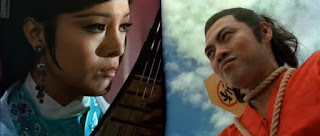Sammo Hung played Butcher Wing, one of the 3 students of Wong Fei-hung. Two other students were played by Yuen Piao and Wei Pai.
Wong Fei-hung was a famous character, especially since Jet Li played him [Once Upon a Time in China]. Jacky Chan also played the character in Drunken Master 1 and 2 [I watched Drunken Master 1 in early 80's but didn't know that the main character's named was Wong Fei-hung, because the movie had been dubbed in English and the character had been named 'Freddy']. There was also a TVB series called 'Patriot Wong'.
 |
| Wong Fei-hung, a servant and his 3 students |
First he came into trouble after he beat one of the men from Five Dragons School, only because someone running after the man and shouting 'thief!' He didn't give both men a chance to explain what the man had taken. Mr Ko, the leader of Five Dragons School, swore not to forgive Butcher Wing if the butcher ever made another mistake. So what if the butcher was found beside the dead body of Mr. Ko's god-daughter, in the butcher's own house? The butcher was innocent, of course, but how to explain to Mr Ko, who had already had prejudice against him?
Sammo Hung might be looked over-weight, but when he fought, he was as quick and as able as those who had proportional bodies. The final fight between Butcher Wing and Mr Ko was well choreographed and I really enjoyed watching Sammo Hung doing somersaults.
 |
| Butcher Wing vs Master Ko |
In The Prodigal Son, although Yen Piao played the lead character, it was Lim Chen-ying who stole the attention. I mostly admired the make-up, how he had been transformed into a 'beautiful' leading lady.
 |
| Before and after |
















































